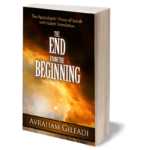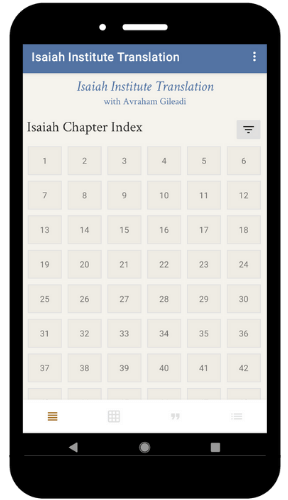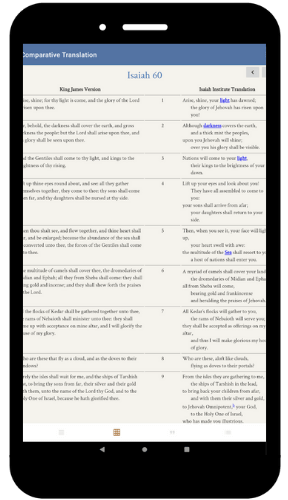Welcome to the 5-week Come Understand Isaiah series!
The most comprehensive resource on the prophecy of Isaiah.
The Isaiah Institute and Book of Mormon Isaiah are pleased to present this series with Isaiah scholar Avraham Gileadi Ph.D. We hope you discover for yourself Jesus' words, "search these things diligently; for great are the words of Isaiah" (3 Nephi 23:1).
"Prelude to God's judgment"
"The Day of Jehovah"
Watch Isaiah 40-49 Round table discussion with Avraham Gileadi
"God's End-Time Servant"
Watch Isaiah 50-57 Round table discussion with Avraham Gileadi
"Restoration of the House of Israel"
Watch Isaiah 58-66 Round table discussion with Avraham Gileadi
"The Coming of the Lord"
Listen to the new podcast Great are the Words of Isaiah
with Avraham Gileadi Ph.D. and Meghan Farner
To begin your journey, we recommend reading or listening to:
Seven Keys for Understanding Isaiah
How can Isaiah's prophecies help me?
Who was the Prophet Isaiah?
What things did Isaiah teach?
Are Old Testament prophets relevant today?
Rude Awakening
Isaiah in Brief
Chiastic Chaos/Creation Pattern of Isaiah 41–46
Isaiah In the Book of Mormon
About Isaiah scholar Avraham Gileadi:
“Dr. Gileadi is the only LDS scholar I know of who is thoroughly competent to teach the words of Isaiah”—Professor Hugh Nibley, Brigham Young University, Provo, Utah.
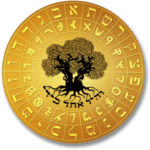
Discover Isaiah with Isaiah Institute Facebook group!
Isaiah 1–12
Having proven from the literary analysis of the Book of Isaiah that his entire prophecy paints an end-time scenario—one that uses the history of Isaiah’s day or soon thereafter as an allegory of the end-time—we can go forward, as Nephi says, and apply Isaiah’s words to ourselves for our profit and learning. In other words, within the end-time context of his prophecy what Isaiah said of God’s people in his day now applies to us. We are the people to whom Isaiah’s words apply.
"Prelude to God's judgment"
Recommended for further study:
Isaiah Made Simple: Unsealing the Essential Isaiah
What is the Relevance of Isaiah 2–14 to the End-Time?
Analytical Commentary of Isaiah
Listen to 30-hour verse-by-verse audio analysis of Isaiah’s prophecies in a modern English translation. It introduces you to Isaiah’s array of keywords, codenames, and word links.
Chapter 1:
Israel’s ancient apostasy typifies an end-time apostasy, with salvation reserved for some who repent.
Chapter 2:
The end-time restoration of Zion/Jerusalem contrasts Jehovah’s judgment of the world at his coming.
Chapter 3:
Wickedness in society leads to anarchy, internal collapse, destitution, and invasion by enemies.
Chapter 4:
In his Day of Judgment Jehovah preserves alive those whose names are inscribed in the Book of Life.
Chapter 5:
Jehovah’s vineyard yields bad fruit, leading to Assyria’s invasion and covenant curses on offenders.
Chapter 6:
Jehovah appears to Isaiah in the temple and sends him as a prophet to warn of imminent judgments.
Chapter 7:
King Ahaz’ transgression of the terms of his covenant leads to a hostile world power gaining supremacy.
Chapter 8:
A new Flood in the form of Assyria’s world conquest awaits all but those who find refuge in Jehovah.
Chapter 9:
A fiery holocaust engulfs the land as leaders and people apostatize and Jehovah empowers his servant.
Chapter 10:
Jehovah appoints the king of Assyria to despoil and destroy the wicked of his people and the nations.
Chapter 11:
As an ensign to the nations Jehovah’s servant gathers a remnant of Israel and Judah in a new exodus.
Chapter 12:
Songs of Salvation and exultation follow Jehovah’s deliverance of a remnant of his people in Zion.
Recommended book for further study: Isaiah Made Simple (160 pages. First edition, Hebraeus Press, 2018)
Isaiah 13–39
In Isaiah’s end-time context, it is the apostasy of God’s people as a whole that precipitates God’s worldwide judgment. As in the pattern of Israel’s ancient exile—the Ten Tribes into Assyria and Jews into Babylon—so long as God’s people maintained a sufficient standard of righteousness, no evil world power could harm them or conquer the world. But when they became worldly, self-righteous, idolatrous, and corrupt, misfortunes in the form of covenant curses became their lot.
"The Day of Jehovah"
Recommended for further study:
The End from the Beginning: The Apocalyptic Vision of Isaiah
Analytical Commentary of Isaiah
We continue the 30-hour verse-by-verse audio analysis of Isaiah’s prophecies in a modern English translation. It introduces you to Isaiah’s keywords, codenames, and word links.
Chapter 13:
The Assyrian alliance destroys the wicked world that is Babylon as God destroyed Sodom and Gomorrah.
Chapter 14:
The king of Assyria/Babylon conquers the world and ascends the heavens but his soul descends to Hell.
Chapter 15:
Moab, a kindred people, suffers calamity in Jehovah’s Day of Judgment, their prayers to no avail.
Chapter 16:
Moab’s prideful people receive three years’ warning before Jehovah destroys them and their land.
Chapter 17:
Disaster overtakes the people of Ephraim and their allies for forgetting Jehovah and loving idols.
Chapter 18:
People’s dread of Assyria’s world conquest is unfounded as Jehovah has prepared a way of escape.
Chapter 19: Although the world’s superpower Egypt suffers internal collapse, Jehovah delivers his covenanters.
Chapter 20:
Assyria subjugates the superpower Egypt after Jehovah’s prophet–servant gives three years’ warning.
Chapter 21:
Jehovah appoints a watchman to warn of Babylon’s imminent fall at the hands of the Assyrian alliance.
Chapter 22:
Sports and amusement addicts suffer enemy invasion; Jehovah appoints his servant in place of another.
Chapter 23:
Tyre, the world shipping empire with its magnates, comes to a sudden end in Jehovah’s Day of Judgment.
Chapter 24:
Wickedness by the earth’s inhabitants leads to a cataclysmic destruction and collapse into chaos.
Chapter 25:
Survivors of the earth’s catastrophic destruction sing praises when Jehovah does away with death.
Chapter 26:
Unlike their oppressive rulers, the righteous survive the earth’s desolation while others resurrect.
Chapter 27:
At his harvest of the earth’s wicked, Jehovah gleans out individually his people who bear good fruit.
Chapter 28:
Ephraim and its prophets reap disaster for being delusional and for rejecting divine revelation.
Chapter 29:
Unsealing the sealed Book of Isaiah overturns the learning of academics and exposes spiritual error.
Chapter 30:
At Jehovah’s coming the rebellious suffer destruction but those who prove loyal enjoy deliverance.
Chapter 31:
Those who trust in Egypt’s military might rely on an arm of flesh as Jehovah alone is all-powerful.
Chapter 32:
Jehovah guides and protects the just but he turns the tables on perverse preachers and complacent women.
Chapter 33:
Jehovah preserves the righteous at his coming but the wicked of his people and the nations burn up.
Chapter 34:
The nations are slaughtered and their lands laid waste in Jehovah’s day of vengeance on behalf of Zion.
Chapter 35:
At the new exodus to Zion the righteous regenerate and the desert blooms, heralding Jehovah’s coming.
Chapter 36:
The king of Assyria invades many lands and lays siege to a remnant of Jehovah’s people in Jerusalem.
Chapter 37:
As King Hezekiah intercedes on behalf of his people Jehovah delivers them from the besieging Assyrians.
Chapter 38:
When interceding with Jehovah on behalf of his people against Assyria, Hezekiah suffers nearly to death.
Chapter 39:
Upon his recovery from illness and Jehovah’s victory over Assyria, Hezekiah gains notoriety.
Isaiah 40–49
As one of two messianic figures in the Book of Isaiah, God’s end-time servant prepares the way for Jehovah/Jesus’ coming to reign on the earth. Called to restore Israel’s twelve tribes, initiate their new exodus out of Babylon on the eve of its destruction, build the new temple, and so forth, his messianic ministry is principally of a temporal nature to prepare the house of Israel—the Jews, Ten Tribes, and Lamanites of today—to meet their God by establishing Zion among them.
Watch Isaiah 40-49 Round table discussion with Avraham Gileadi
"God's End-Time Servant"
 Recommended for further study:
Recommended for further study:
Isaiah Decoded: Ascending the Ladder to Heaven
Analytical Commentary of Isaiah
Chapter 40:
Having spiritually ascended, Zion/Jerusalem declares good tidings to those who have yet to ascend.
Chapter 41:
Jehovah’s righteous servant, who hails from the east, leads Jacob/Israel’s returnees in a new conquest.
Chapter 42:
Jehovah’s appointing his servant as a light to the nations leads to a new exodus or to captivity.
Chapter 43:
Jehovah’s people who repent of idolatry return in a new exodus from the four directions of the earth.
Chapter 44:
Jehovah’s servant resembles Moses and Cyrus in dissuading people from idols and rebuilding the temple.
Chapter 45
Jehovah’s servant resembles David and Cyrus in restoring Jehovah’s people and routing their enemies.
Chapter 46:
Jehovah sends his servant as a bird of prey to turn his errant people from idolatry to righteousness.
Chapter 47:
The Harlot Babylon, who rules as Mistress of Kingdoms, descends into the dust in Jehovah’s Day of Judgment.
Chapter 48:
Jehovah’s servant calls on Jacob/Israel to forsake its idols and return in a new exodus out of Babylon.
Chapter 49:
Jehovah empowers his servant after he is rejected to restore his people and to implement their new exodus.
Isaiah 50–57
As the Savior and Redeemer of his people, it is Israel’s own God who “pays the price of our peace” and fulfills the role of his people’s Messiah. The new covenant he makes with his elect, whom his end-time servant gathers to Zion, forms a composite of all the positive features of the covenants he made with his people and with individuals in the past, namely divine protection against enemies, paradisiacal lands of inheritance, and offspring endowed with his Holy Spirit.
Watch Isaiah 50-57 Round table discussion with Avraham Gileadi
"Restoration of the House of Israel"
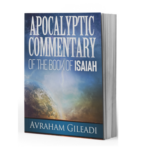
Recommended for further study:
Apocalyptic Commentary of the Book of Isaiah
Analytical Commentary of Isaiah
Chapter 50:
Jehovah’s servant meets hostility from those who sell themselves, who light their way with mere sparks.
Chapter 51:
Jehovah empowers his servant as an arm of righteousness to deliver his people in an exodus to Zion.
Chapter 52:
Jehovah’s servant and Zion’s watchmen accomplish Zion’s restoration beginning with a new exodus.
Chapter 53:
Jehovah’s descent phase as a sacrificial lamb (before his ascent as King of Zion) atones for transgressors.
Chapter 54:
Jehovah’s millennial covenant is a composite of all covenants he made with his people and with individuals.
Chapter 55
As a witness and lawgiver to the nations, Jehovah’s servant mediates the new covenant with his people.
Chapter 56:
Jehovah curses the blind watchmen of his people but exalts his servants who hold fast to his covenant.
Chapter 57:
Jehovah gathers the righteous from among the wicked whose practices turn cultic and perverse.
Isaiah 58–66
A final division takes place between the righteous and the wicked of God’s people as the coming of the Lord draws near. Even as evil reaches its zenith, God empowers his repentant people over it. His coming to them as the embodiment of Salvation contrasts sharply with the ignominious fate of their enemies. While God’s servants—those who serve as saviors to his people—inherit glory, those from among their own brethren who persecuted them suffer an everlasting shame.
Isaiah 58-66 "The Coming of the Lord"
 Recommended for further study:
Recommended for further study:
Endtime Prophecy: A Judeo-Mormon Analysis
Analytical Commentary of Isaiah
Chapter 58:
Relieving the oppressed and observing the Sabbath sanctify fast days and beget covenant blessings.
Chapter 59:
Jehovah’s coming spells retribution for deceivers and predators but deliverance for those who repent.
Chapter 60:
At the return to Zion of kings and peoples, Jehovah transforms the land and the millennial age begins.
Chapter 61:
For having endured shame those whom Jehovah’s servant endows receive a twofold millennial inheritance.
Chapter 62:
Zion/Jerusalem’s watchmen cry to Jehovah day and night as they prepare the way for Jehovah’s coming.
Chapter 63:
At his coming, Jehovah takes vengeance on those whom he had redeemed but who yet rebelled against him.
Chapter 64:
As Jehovah’s coming draws near, transgressors suffer for their misdeeds at the hands of their enemies.
Chapter 65:
As the millennial age approaches, blessings and curses separate Jehovah’s servants from their oppressors.
Chapter 66:
Cultic practices and persecution by ecclesiastical leaders coincide with Zion’s rebirth before Jehovah comes.
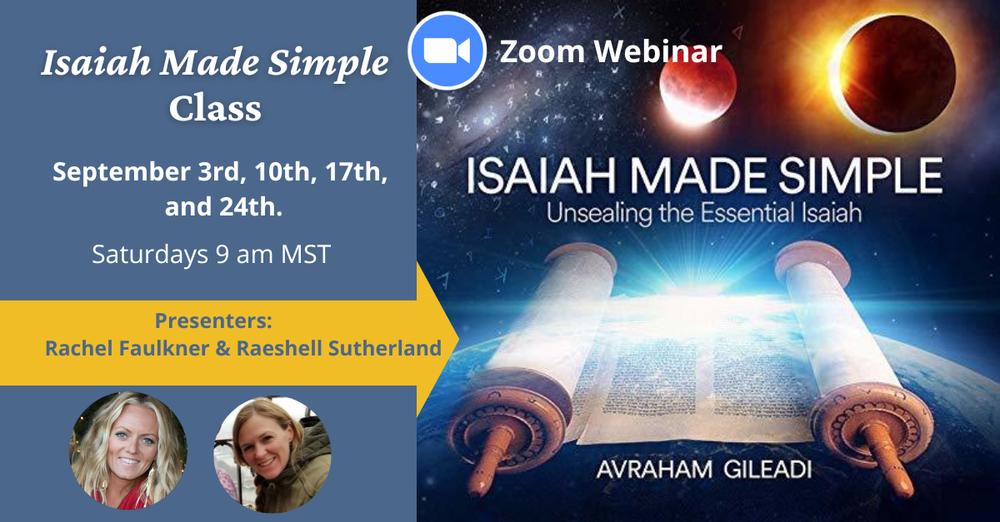 Click here to view our FREE 4-week Isaiah Made Simple Class!
Help us to share the words of Isaiah!
Click here to view our FREE 4-week Isaiah Made Simple Class!
Help us to share the words of Isaiah!
Comprehensive Isaiah Explained App
If you have enjoyed the vast Isaiah resources available on IsaiahExplained.com, you can now download them to your mobile device for only $4.99. The Isaiah Institute wants to express its gratitude to two generous donors for their $20,000 contribution that made this app possible.

